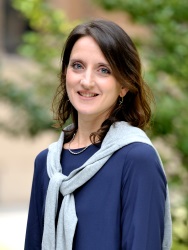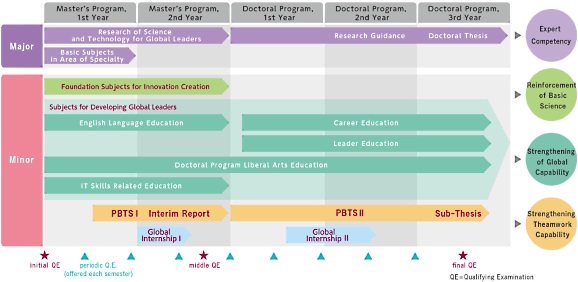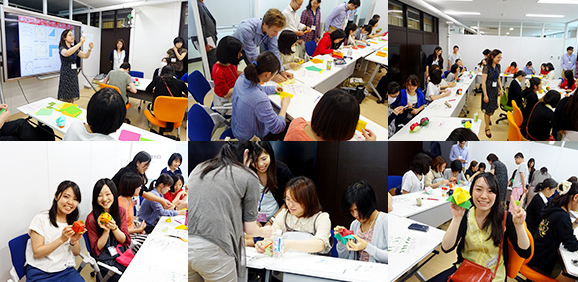Class List of Fall Semester 2017
“Essential Bioinformatics for Global LeadersⅠ” will begin on October 4. This is a class for students in “Minor Course of Science and Technology for Global Leaders”. But all master’s & doctoral students can take it if you have interest. The class will be conducted in English.
Theme & Objective
 Bioinformatics is an interdisciplinary research area at the interface between biological science and computational science, the ultimate goal of which is to better understand living cells and their functioning at the molecular level. It involves the technologies that use computers for the storage, retrieval, manipulation, understanding and distribution of information related to biological macromolecules such as DNA, RNA, protein, and even more.
Bioinformatics is an interdisciplinary research area at the interface between biological science and computational science, the ultimate goal of which is to better understand living cells and their functioning at the molecular level. It involves the technologies that use computers for the storage, retrieval, manipulation, understanding and distribution of information related to biological macromolecules such as DNA, RNA, protein, and even more.
The “Essential Bioinformatics for Global Leaders I” classes has been conceived for non-biologist as well as biologist students wishing to acquire global leader skills and enrich their scientific English. This first series of interactive classes, given in friendly English, will provide the students with the fundamental cellular and molecular biology knowledge needed to understand bioinformatics. Important notions of bioinformatics, its logical background and its cutting-edge applications in basic biology research, biotechnology and biomedical sciences will also be introduced. The classes include lectures, discussion and practices [wet lab (basic molecular biology experiments) and dry lab (databases exploration, data analysis using software)]. The students do not need to understand the mathematical details in the field.
Message to Students
These interactive classes are open to everyone, from biological background or not. They will provide you with the basis for a general understanding of cell and molecular biology. If you are new to Biological Sciences, you will have a chance to do your first biological experiments. If you already know about the field, it will be a great opportunity for you to improve your skills, widen your knowledge and in any cases listen and practice your English! Do not hesitate to join that fun experience!
Lecture Outline
| Subject |
|---|
| Essential Bioinformatics for Global LeadersⅠ [17S1003] |
| Number of Credits |
| 2.0 |
| Instructor |
| Gouraud, Sabine (Project Associate Professor of Ochanomizu University) |
| Target Audience |
| Graduate Students |
| Date, Time and Location |
|
October 4, Period 5-6 (13:20-14:50) Graduate School of Humanities & Sciences Building R408 October 11, Period 5-6 (13:20-14:50) Graduate School of Humanities & Sciences Building R408 October 18, Period 5-6 (13:20-14:50) Graduate School of Humanities & Sciences Building R408 October 25, Period 5-6 (13:20-14:50) Graduate School of Humanities & Sciences Building R408 November 1, Period 5-6 (13:20-14:50) Graduate School of Humanities & Sciences Building R408 November 8, Period 5-6 (13:20-14:50) Graduate School of Humanities & Sciences Building R408 November 15, Period 5-8 (13:20-16:30) Science building 1 R521 November 22, Period 5-6 (13:20-14:50) Science building 2 R202 November 29, Period 5-6 (13:20-14:50) Science building 2 R202 December 6, Period 5-8 (13:20-16:30) Science building 1 R521 December 13, Period 5-8 (13:20-16:30) Science building 1 R521 December 20, Period 5-6 (13:20-14:50) Graduate School of Humanities & Sciences Building R408 |
| Lecture Plan |
|
1) Oct 4th, 2017: 90 min, Graduate School of Humanities room 408 2) Oct 11th, 2017: 90 min, Graduate School of Humanities room 408 3) Oct 18th, 2017: 90 min, Graduate School of Humanities room 408 4) Oct 25th, 2017: 90 min, Graduate School of Humanities room 408 5) Nov 1st, 2017: 90 min, Graduate School of Humanities room 408 6) Nov 8th, 2017: 90 min, Graduate School of Humanities room 408 7-8) Nov 15th, 2017: 180 min, Science building 1, Practice room 521 9) Nov 22nd, 2017: 90 min, Science building 2 room 202 10) Nov 29th, 2017: 90 min, Science building 2 room 202 11-12) Dec 6th, 2017: 180 min, Science building 1, Practice room 521 13-14) Dec 13th, 2017: 180 min, Science building 1, Practice room 521 15) Dec 20th, 2017: 90 min, Graduate School of Humanities room 408 |
| Textbook/Reference |
| Essential Cell Biology (Garland Science), Molecular Biology of the Cell(Garland Science), Bioinfomratics for Beginners (Academic Press) Supratim Choudhuri |
Registration
Registration Period: Mon., October 2 through Sat., October 14
If you cannot register during above period, please contact Academic Affairs Office in Student Affairs Building.
Contact
Ochanomizu University Leading Graduate School Promotion Center
Tel: 03-5978-5775
E-mail:





